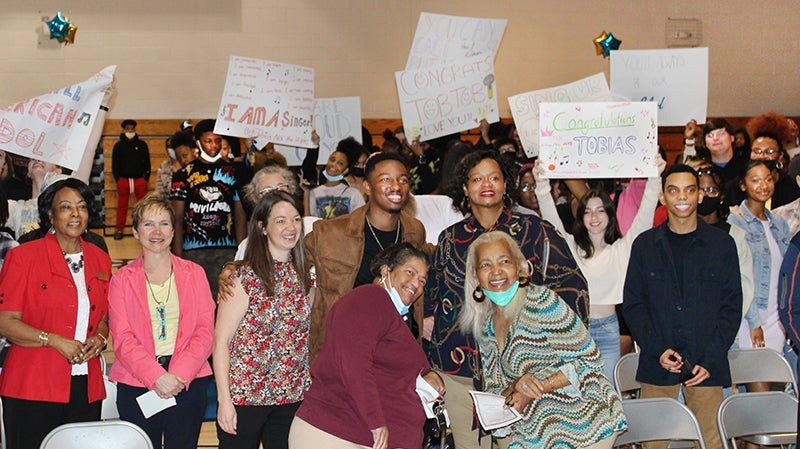Ahoskie’s indoor service doesn’t deter the spirit
Published 9:41 am Tuesday, May 31, 2016
AHOSKIE – On Memorial Day we honor those who have fallen in war – and though they have passed from this life, their spirits and memories live on; and honoring their sacrifice means more than firing up the grill.
That was especially brought home on Monday at the Ahoskie Memorial Day tribute, moved from its usual No Man’s Land location at Main and Railroad streets to the American Legion Post 102 Legion Building on McGlohon Street.
Post Commander James Hutchinson welcomed a sparse, but patriotic crowd of some 25 individuals to the Post’s main floor and auditorium.

American Legion Post 102 Commander James Hutchinson (left) chats with local military veteran James Britt following the Ahoskie Memorial Day service. Staff Photo by Gene Motley
“Those who have served and currently serve in the uniform of the United States are ever mindful that the experience of enduring peace is only maintained by the bitterness of sacrifice,” Hutchinson remarked. “We are compelled to never forget that while we enjoy our daily pleasures, there are others who have endured, and may still be enduring the agony and pain for a better pace of living.”
As part of the ceremony, Hutchinson read the story of “The Empty Table”, or “Missing Man Table”. It is a simple four-legged table set for one with a white tablecloth, a black napkin and white candle, and a plate with only a slice of lemon and salt, with an empty chair leaning against it.
The tradition is done in remembrance of prisoners of war and those missing in action had its beginnings with a group of fighter pilots who flew in Vietnam. Started by the Red River Valley Fighter Pilots Association – the so-called River Rats of Vietnam – it has now spread nationwide where remembrance tables are set when units or commands gather for dinners or reunions.
The symbols on the table begins with the white tablecloth representing purity of heart, the black napkin the sorrow of captivity and the white candle, peace. The lemon represents the missing service member’s bitter fate and the salt is the tears shed by the families of the missing.
“Because we have comrades who are unable to be with their loved ones and families,” Hutchinson read, “we join together to pay homage and tribute to them and give witness to their continued captivity.”
The Table Ceremony was followed by the singing of the National Anthem. Then, Post Chaplain Roger Kiker delivered the Memorial Remembrance, a simple speech reminding all of how Memorial Day – a tradition of honoring Civil War dead and known as Decoration Day in the 19th Century – grew to a tradition now honored around the world.
“It’s an honor to stand before you and share with you about the great men and women who gave their life for their country; and we should never forget what they stand for,” Kiker intoned. “The blood they shed that we may enjoy the freedoms we enjoy today.”
“It is because of the certainty of death that we place such a high premium on life,” Kiker continued. “If we lived forever and experienced no loss, we would never be able to fully appreciate the moments in life that make us truly happy.”
The minister recounted the numbers of service people who had died in all America’s conflicts from the American Revolution to the conflicts in the Middle East and Afghanistan.
“This day is not for honoring the veteran, but those who made the supreme sacrifice,” he noted.
Kiker closed with the words of Civil War orator Robert G. Ingersoll.
“These heroes are dead, “Ingersoll related. “They died for liberty – they died for us. They are at rest. They sleep in the land they made free, under the flag they rendered stainless, and under the solemn pines, the sad hemlocks, the tearful willows, and the embracing vines. They sleep beneath the shadows of the clouds, careless alike of sunshine or of storm, each in the windowless Place of Rest. While earth may run red with other wars – they are at peace. In the midst of battle, in the roar of conflict, they found the serenity of death. I have one sentiment for soldiers living and dead: cheers for the living; tears for the dead.”
Following the reading of “In Flanders Fields” by Mrs. Hutchinson, there were closing remarks, and a prayer.
The Ahoskie service ended with the solemn playing of ‘Taps’ on trumpet by ECU student Patrick Rose.


